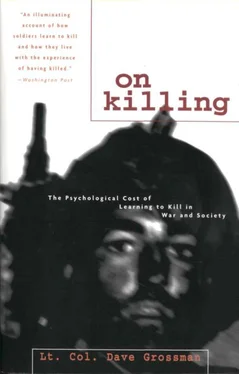This has been mentioned elsewhere, but it bears repeating that the universal distribution of automatic weapons in Vietnam is probably responsible for much of this large number of shots fired per kill. Much of this firing was also suppressive fire and reconnaissance by fire. And much of it was by crew-served weapons (e.g., squad machine guns, helicopter door gunners, and aircraft-mounted miniguns firing thousands of rounds per minute), which, as mentioned before, almost always fire. But even when these factors are taken into consideration, the fact that so much fire occurred and that so many individual soldiers were willing to fire indicates that something different and unusual was happening in Vietnam. This subject is addressed in detail later in this book in the section “Killing in Vietnam.”
A detailed analysis of these stages of a kill can be found in the section entitled “The Killing Response Stages.”
Stewart concludes the article with this sentence. The object of his tale, the climax. The point of this lengthy article appears to be this line that communicates the extent of his empathy for his victim and gives him a little peace: “that hard look had left his eyes before he died.” The message we can take away from this is that he cared deeply what this dying VC thought of him, and what the reader thinks of him. If we look for it, over and over again in these killing narratives we will find this underlying message of (1) the writer’s empathy for his kill and (2) a deep concern for what the reader thinks of the writer. We will address these needs in much greater detail in the section “Killing in Vietnam.”
But the Greeks refused to use “unmanly” projectile weapons, and the uniquely designed javelins and pilums cast in volleys by Roman soldiers — combined with the Romans’ superior training in thrusting the sword, their maneuverability on the battlefield, and their use of leaders — ultimately permitted the professional Roman legions to defeat the citizen-soldiers of the Greek phalanx.
Yet even with all their emphasis on stabbing wounds, it appears that many Roman soldiers still slashed and hacked at the enemy, for we read constantly of enemy soldiers who suffer multiple slash wounds as a result of their encounters with the Roman legions. In his Commentaries on the Gallic War, Caesar mentions how after a battle the enemy, “at length, worn out with wounds, …began to retreat.”
It is interesting to note that the new U.S. Army M16 bayonet is a very wicked-looking, saw-backed device.
Some would claim that writing of such esoteric killing techniques in a public forum is an inappropriate act, since they now become “thinkable.” In some martial arts organizations the release of such “secret” or “high-level” techniques can result in disciplining and censure. This whole subject of modeling violence and making the unthinkable thinkable is addressed in the section “Killing in America.” In actuality it must also be noted that the construction of the skull and eye socket make it difficult to get into the brain, and I believe that, in consideration of the potential audience, the benefit associated with using this example in this context far outweighs any potential harm.
Permit me to caveat all of this just a little. Freud made similar observations as to the latent homosexuality of men who smoked large cigars, but as a cigar smoker himself Freud was quick to add that “sometimes a cigar is just a cigar.” In the same way let me simply add, as a soldier and a gun owner, that sometimes a gun is… just a gun.
Helping a veteran in such a situation involves encouraging him to share his experience, confronting the word “murder,” and discussing the Bible’s or Torah’s view on killing.
Encouraging Him to Share This Experience with His Wife. In this case I suggested that he do this by asking her to read William Manchester’s Goodbye, Darkness and then use a remarkably similar incident in that book as a point of departure to discuss his experience. (The need for the vet to share with his wife and the value of a book to serve as point of departure are recurring themes in this kind of counseling. Early drafts of this book have served just such a purpose on several occasions.)
Encouraging Him to Confront His Use of the Word “Murder.” It was not murder, it was self-defense, and if it happened in the street tomorrow no charges would be pressed. His answer, as it is so often when the veteran represses and never discusses these situations, was “I never looked at it that way.” (This is a common and repeated theme in such counseling.)
Discussing What the Bible or the Torah Says about Killing. I encouraged him to study the matter further or discuss it with a clergyman of his faith. This is another common and important theme. There is a body of belief in America that it is not “good” to be a soldier. Much of this antimilitary bias is founded on the commandment “Thou shalt not kill,” but within the realm of Christianity there is great disagreement on this matter, and it is not nearly that simple. For the sake of therapy among soldiers I have found that there is great value in presenting the other side of the theological debate about killing.
In Exodus, chapter 20, we find the Ten Commandments. Almost four hundred years ago the King James Version translated the Sixth Commandment as “Thou shalt not kill.” When the translators wrote that, no one ever dreamed that “God’s word” would be taken so out of context as to interpret this commandment to mean that the death penalty or killing on the battlefield is wrong. In this century, with only one exception, every major modern translation has translated this commandment as “Thou shall not murder.” In chapter 21 of the same book of the Bible (on the same page as the Ten Commandments in most Bibles) the death penalty is commanded when it says: “He that smiteth a man, so that he die, shall surely be put to death” (Exodus 21:12). The Hebrew word used in the original text of the Sixth Commandment refers to killing for your own personal gain; it has nothing to do with killing under authority. And this is not the first or the last time that the death penalty is commanded by God. In Genesis 9:6, when he got off the ark, Noah was commanded by God, “Whosoever sheddeth man’s blood, by man shall his blood be shed.”
King David was a “man after God’s own heart,” and he was also a man of war. The Bible praises David for killing Goliath in battle, and as a king he is praised: “Sol killed his thousands, but David has killed his tens of thousands.” Killing in war, under authority, is presented as honorable and acceptable throughout the Bible. It was only when King David committed murder, in killing Uriah, that he got into trouble with God. The Old Testament is full of such righteous warrior leaders. David, Joshua, and Gideon are just a few of the hundreds of soldiers mentioned in the Old Testament who found favor in God’s eyes for their labors on the battlefield. In Proverbs 6:17, the Bible says that God “ hates… shedders of innocent blood [emphasis added].” But there is nothing but honor in the Bible for the soldier who kills in just combat.
In the New Testament the story is the same. When the rich young man came to Jesus he was told that he must give away everything he had in order to follow Jesus. But in Matthew 8:10, when the Roman centurion came to him, Jesus said, “I have not found so great a faith, no, not in Israel.” And in Acts, chapter 10, the first non-Jewish Christian was designated by God, and he was Cornelius… a Roman centurion. God sent Peter to convert him, and it appears to have been a bit of a shock to Peter (and all the other disciples) that a non-Jew could be a Christian, but he never questioned that a soldier should have the honor of being the first one. Most of chapter 10 of the Book of Acts is devoted to Peter’s sermon to the centurion Cornelius and his guidance as to how to be a Christian, but never once does Peter, or anyone else, anywhere in the Bible, state that it is incompatible to be a soldier and a Christian. Indeed, exactly the opposite is communicated over and over again.
Читать дальше







